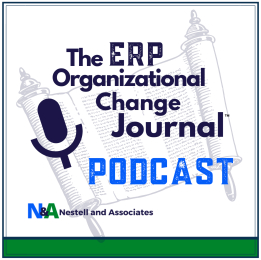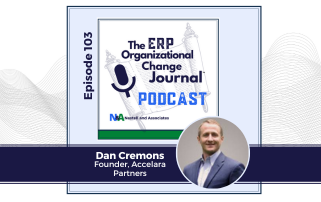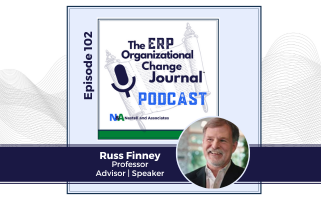
In this episode: We look at Jobs-to-be-Done Theory for ERP Organizational Change Success
We talk with Tony Ulwick, the author of “Jobs-to-be-Done: Theory to Practice” and the CEO of Strategyn. The discussion focuses on how Jobs-to-be-Done Theory can be used to drive innovation in large-scale ERP organizational change. Ulwick shares his insights on corporate culture, growth strategy, and product value, as well as his Outcome-Driven Innovation process. The episode also explores the importance of establishing a common language in organizations and offers actionable advice for putting theory into practice. Listeners can gain valuable knowledge and perspectives from Ulwick’s experience in innovation and his pioneering work in Jobs-to-be-Done Theory.

Tony Ulwick
More About Tony
Tony is the pioneer of Jobs-to-be-Done Theory and the inventor of Outcome-Driven Innovation® (ODI), a powerful strategy and innovation process with a documented success rate that is 5-times the industry average. Tony has been granted 12 patents for his game-changing innovation practices, which result in products that help customers get a “job” done better.
Philip Kotler, S. C. Johnson Distinguished Professor of International Marketing at the Kellogg School of Management, Northwestern University says, “I call Ulwick the Deming of Innovation because, more than anyone else, Tony has turned innovation into a science.”
Tony began his career with IBM’s PC division in 1981. Witnessing the failure of the PCjr, Tony was inspired to develop a better approach to innovation. Since founding the innovation consultancy Strategyn in 1991, he and his global team of ODI practitioners have led strategy engagements with over one-third of the Fortune 100, helping them generate billions of dollars in revenue growth.
In 2002, Tony introduced Harvard Business Review readers to ODI in the article Turn Customer Input into Innovation. HBR recognized ODI as one of the best business ideas of the year, declaring it one of “the ideas that will profoundly affect business as we forge ahead in today’s complex times.”
Tony is the author of the original Jobs-to-be-Done book, What Customers Want, his recent release, JOBS TO BE DONE: Theory to Practice, and additional articles on ODI published in HBR and MIT Sloan Management Review. Through his involvement in hundreds of innovation initiatives, Tony has helped companies reinvent underperforming products, create new business models, and build and implement company-wide innovation programs. His work is cited in hundreds of publications.
As an innovation thought leader, inventor, author and speaker, Tony Ulwick has changed the way academics and executives alike think about growth strategy and product innovation.
Website: strategyn.com
Free Book Download: https://jobs-to-be-done-book.com/
youtube: https://www.youtube.com/@Strategyn
Episode Mentions
- “People don’t want to buy a quarter-inch drill, they want a quarter-inch hole.”, Theodore Levitt, cited in: Clayton Christensen (2016), The Clayton M. Christensen Reader. p. 46
- “If I had asked people what they wanted, they would have said faster horses.”-Henry Ford
- Magretta, J. (2011). Understanding Michael Porter: The essential guide to competition and strategy. Harvard business press.
- Ulwick, A. W., & Osterwalder, A. (2016). Jobs to be done: theory to practice.
Episode Highlights Timeline
02:26 Tony ntroduces himself
07:50 Theory, in chapter one , “Why do innovation projects failure” you discuss that often there is no agreement on what a “need” even is. That is, all companies are out to provide the best quality products and services, but this means understanding the needs of customers. How do organizations align and why would this be a discussion in your “Theory” section?
14:49 I really like your second chapter where you discuss frameworks in which to determine needs. Can you define for our listeners what you mean by a “framework” and share the 6 types of customer needs?
17:45 Obviously, the idea with an ERP is to provide a tool in which to improve process efficiencies and to do so more cost-effectively in the long run. You discuss Differentiated Strategy, Dominant strategy, Disruptive strategy, Discrete strategy, and Sustaining strategy. How can they be applied to a large-scale ERP organizational change?
26:32 You describe your Outcome-Driven Innovation (ODI) in your book and share that “unique quantitative research methods that enable companies to analyze markets in ways that have never before been possible.” You discuss this in a full chapter in your book, but can you lead our listeners through this process in general?
37:05 It is one thing to understand a model, process, or theory…it is entirely another thing to execute (effectively and efficiently) upon that model, process, or theory. What can you share about putting the theory to practice? That is, if one wants to take your insight and advice and apply it to the “real world”, Where does one start?
41:44 In your “Practice” section you discuss the value of “a common language”. Please explain what you mean by that.
44:25 Lastly, Tony, If you were going to give advice, or one golden nugget, to an organization preparing for a large-scale ERP organizational change what takeaway would you like to leave with our listeners that could benefit them and their organization?
Related Episodes
- Episode 77: Organizational Culture for Effective Change Management – Guest Daryl Conner
- Episode 76: Changing Your Company from the Inside Out: A Guide for Social Intrapreneurs – Guest Chris White
- Episode 70: Software Development and its Role in Digital Innovation, Digital Transformation, and ERP Success – Guest Steve Douglas
- Episode 69: ERP Organizational Learning and Performance Improvement – Guest Caroll Panza
- Episode 61: Creating Successful ERP Results Through Instructional & Organizational Learning Design Processes – Guest Lisa Giacumo
- Episode 58: Stakeholders in Change Management for Long-Term ERP Success -Guest Jennifer Scheehie
- Episode 55: Reframing Organizations: Artistry, Choice, And Leadership – Guest Dr. Lee Bolman
Latest Episodes
Human Capital in PE-Backed Companies: Strategies for Leadership and Talent Management
Human Capital in PE-Backed Companies: Strategies for Leadership and Talent ManagementEpisode Overview - PE-backed Human Capital Strategies Today’s episode centers on the pivotal role of human capital in PE-backed companies, emphasizing how strategic leadership and...
ERP Organizational Change: Technology Strategy
ERP Organizational Change: Technology Strategy and Keys to SuccessEpisode Overview - Technology Strategy In general, at the highest level of categorization, there seems to be consensus on the importance of people and culture, informational technology, and project...
AI and Private Equity Synergy: Fueling Business Transformation
AI and Private Equity Synergy: Fueling Business TransformationEpisode Overview - AI in PE Strategies In this episode, we explore how AI and Private Equity synergies are fueling business transformations and reshaping investment strategies and operational efficiencies....
Looking to Drive Innovation in Your Organization?
At Nestell & Associates, we specialize in implementing innovative solutions that help companies succeed. Contact us today to learn more about Digital Transformation and Organizational Change Management and how we can help you achieve your goals and take your organization to the next level.
About Nestell & Associates
Where People, Processes, and Technology Align
Nestell & Associates is a highly specialized IT and ERP change management consulting firm that serves as a business-savvy, tenured, and highly technical-proficient business partner to private equity firms. We provide expert vendor-neutral IT and ERP services necessary to support their business objectives. Our team of experts excels at organizational change, preparedness, and digital transformation success.
Our approach has been proven to be successful by focusing on key areas such as organizational culture, change, and readiness, we’ve helped our clients achieve their IT and ERP business objectives from improving IT security to managing complex transformational M&A initiatives.
We are passionate about helping our clients succeed and achieving positive outcomes. Our goal is to provide the most efficient, organized, experienced, and productive professionals in the industry to implement processes, resources, and technology that will give our private equity partners a competitive advantage and deliver real return on investment.




0 Comments